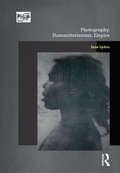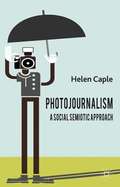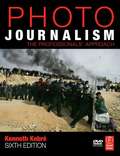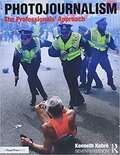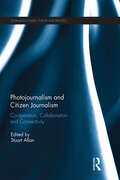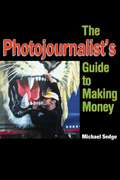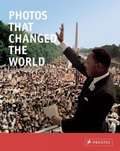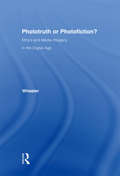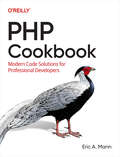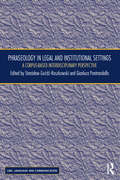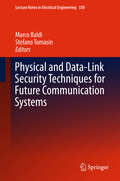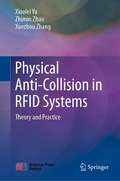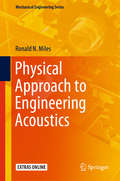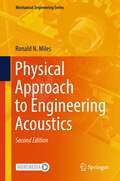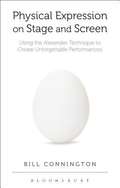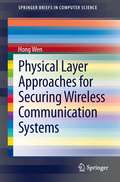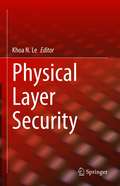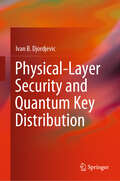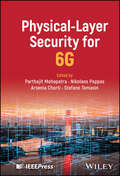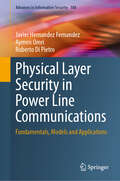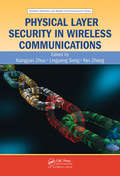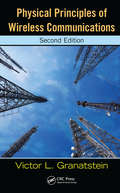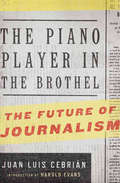- Table View
- List View
Photography, Humanitarianism, Empire (Photography, History: History, Photography)
by Jane LydonWith their power to create a sense of proximity and empathy, photographs have long been a crucial means of exchanging ideas between people across the globe; this book explores the role of photography in shaping ideas about race and difference from the 1840s to the 1948 Declaration of Human Rights. Focusing on Australian experience in a global context, a rich selection of case studies – drawing on a range of visual genres, from portraiture to ethnographic to scientific photographs – show how photographic encounters between Aboriginals, missionaries, scientists, photographers and writers fuelled international debates about morality, law, politics and human rights.Drawing on new archival research, Photography, Humanitarianism, Empire is essential reading for students and scholars of race, visuality and the histories of empire and human rights.
Photojournalism: A Social Semiotic Approach
by Helen CapleThis book explores the role of photographs in newspapers and online news, analyzing how meanings are made in images and exploring text-image relations, illustrated with authentic news stories from both print and online news outlets.
Photojournalism: The Professionals' Approach (6th edition)
by Kenneth KobréThis manual provides technical and practical information about a wide range of topics within the photojournalism field. Topics include covering news, features, sports, politics, and contemporary issues; finding features; environmental and interpretive photos; use of the strobe, digital cameras; the law and professional ethics, photo editing; and a brief history of photojournalism.
Photojournalism: The Professionals' Approach
by Kenneth KobrePhotojournalism: The Professionals' Approach is the definitive book on photojournalism, delivering a blend of insightful interviews with professionals, practical techniques, and high-impact photographs. <p><p> This edition features updates on social media in photojournalism, shooting video on smart phones, and the use of drones to cover the news. It also includes revised chapters on audio and video, and additional international case studies including, among others, approaches to covering the Arab Spring, the Ukrainian Revolution, and resurgent white supremacy in South Africa. New interviews and case studies bring readers on assignment with industry greats, whose experiences provide a guide on how to take your work from a hobby to a profession. The revised and expanded business chapter goes the next step and outlines how to make a living in photojournalism. <p><p> Often called the "bible" of the industry, Photojournalism continues to be the must-have reference for photojournalists that it has been for nearly 40 years.
Photojournalism and Citizen Journalism: Co-operation, Collaboration and Connectivity (ISSN)
by Stuart AllanIf everyone with a smartphone can be a citizen photojournalist, who needs professional photojournalism? This rather flippant question cuts to the heart of a set of pressing issues, where an array of impassioned voices may be heard in vigorous debate. While some of these voices are confidently predicting photojournalism's impending demise as the latest casualty of internet-driven convergence, others are heralding its dramatic rebirth, pointing to the democratisation of what was once the exclusive domain of the professional.Regardless of where one is situated in relation to these stark polarities, however, it is readily apparent that photojournalism is being decisively transformed across shifting, uneven conditions for civic participation in ways that raise important questions for journalism’s forms and practices in a digital era. This book's contributors identify and critique a range of factors currently recasting photojournalism's professional ethos, devoting particular attention to the challenges posed by the rise of citizen journalism. This book was originally published as two special issues, in Digital Journalism and Journalism Practice.
The Photojournalist's Guide to Making Money
by Michael SedgeMarket savvy, expert research, and first-rate resources combine to make this book the tutor that can take experienced photojournalists to new heights of success-while showing aspiring photojournalists how to begin their climb in a stimulating and rewarding field. Step-by-step instructions tell how to establish a business, implement the latest research tactics, network with editors and other photo buyers, pitch to television producers, and expand business through lectures and teaching. Extensive sections in Internet marketing detail cutting-edge strategies for tapping into the lucrative photojournalism marketplace.
Photos that Changed the World
by Peter StepanPhotos that Changed the World gathers together images of pivotal moments in world history in one stunning volume. This book presents nearly one hundred of history's most memorable photographs -- from the Wright Brothers' first flight to the bombing of Pearl Harbor, from Martin Luther King's "I Have a Dream" speech to Nelson Mandela's release from prison, and from the inauguration of President Barack Obama to the Syrian refugee crisis. The volume features pictures from photography masters such as Lewis Hine, Dorothea Lange, Yousuf Karsh, Diane Arbus, and James Nachtwey, as well as iconic images from lesser-known and unknown photojournalists. Photos that Changed the World has been updated to include indelible images of the most significant recent events. Engaging essays accompany each photograph and tell the story behind each image. <p><p> NOTE: Images not included
Phototruth Or Photofiction?: Ethics and Media Imagery in the Digital Age
by Thomas H. WheelerThis text examines the use of images in journalistic contexts and the manipulation of these images to accomplish varying objectives. It provides a framework for critical discussion among professionals, educators, students, and concerned consumers of newspapers, magazines, online journals, and other nonfiction media. It also offers a method of assessing the ethics of mass-media photos, which will help visual journalists to embrace new technologies while preserving their credibility. Phototruth or Photofiction? also: *recounts the invention of photography and how it came to be accorded an extraordinary degree of trust; *details how photos were staged, painted, composited and otherwise faked, long before digital technology; *lists contemporary image-altering products and practices; *details many examples of manipulated images in nonfiction media and lists rationales offered in defense of them; *explains how current ethical principles have been derived; *lays groundwork for an ethical protocol by explaining conventions of taking, processing, and publishing journalistic photos; and *offers tests for assessing the appropriateness of altered images in non-fiction media. Each chapter is followed by "Explorations" designed to facilitate classroom discussion and to integrate into those interactions the students' own perceptions and experiences. The book is intended for students and others interested in the manipulation of images.
PHP Cookbook: Modern Code Solutions for Professional Developers
by Eric A. MannIf you're a PHP developer looking for proven solutions to common problems, this cookbook provides code recipes to help you resolve numerous scenarios. By leveraging modern versions of PHP through version 8.1, these self-contained recipes provide fully realized solutions that can help you solve similar problems in your day-to-day work.Whether you're new to development or merely new to PHP, these recipes will help you unpack the most powerful features of this programming language. Author Eric Mann, a regular contributor to php[architec magazine, frequently makes presentations on software architecture and has built scalable projects for startups and Fortune 500 companies alike.Learn the type system of modern PHPBuild efficient applications composed of functions and objectsUnderstand key concepts such as encryption, error handling, debugging, and performance tuningExplore the PHP package/extension ecosystemLearn how to build basic web and basic command-line applicationsWork securely with files on a machine, both encrypted and in plain text
Phraseology in Legal and Institutional Settings: A Corpus-based Interdisciplinary Perspective (Law, Language and Communication)
by Stanislaw Goźdź-Roszkowski Gianluca PontrandolfoThis volume presents a comprehensive and up-to-date overview of major developments in the study of how phraseology is used in a wide range of different legal and institutional contexts. This recent interest has been mainly sparked by the development of corpus linguistics research, which has both demonstrated the centrality of phraseological patterns in language and provided researchers with new and powerful analytical tools. However, there have been relatively few empirical studies of word combinations in the domain of law and in the many different contexts where legal discourse is used. This book seeks to address this gap by presenting some of the latest developments in the study of this linguistic phenomenon from corpus-based and interdisciplinary perspectives. The volume draws on current research in legal phraseology from a variety of perspectives: translation, comparative/contrastive studies, terminology, lexicography, discourse analysis and forensic linguistics. It contains contributions from leading experts in the field, focusing on a wide range of issues amply illustrated through in-depth corpus-informed analyses and case studies. Most contributions to this book are multilingual, featuring different legal systems and legal languages. The volume will be a valuable resource for linguists interested in phraseology as well as lawyers and legal scholars, translators, lexicographers, terminologists and students who wish to pursue research in the area.
Physical and Data-Link Security Techniques for Future Communication Systems
by Marco Baldi Stefano TomasinThis book focuses on techniques that can be applied at the physical and data-link layers of communication systems in order to secure transmissions against eavesdroppers. Topics ranging from information theory-based security to coding for security and cryptography are discussed, with presentation of cutting-edge research and innovative results from leading researchers. The characteristic feature of all the contributions is their relevance for practical embodiments: detailed consideration is given to applications of security principles to a variety of widely used communication techniques such as multiantenna systems, ultra-wide band communication systems, power line communications, and quantum key distribution techniques. A further distinctive aspect is the attention paid to both unconditional and computational security techniques, providing a bridge between two usually distinct worlds. The book comprises extended versions of contributions delivered at the Workshop on Communication Security, held in Ancona, Italy, in September 2014 within the framework of the research project "Enhancing Communication Security by Cross-layer Physical and Data-link Techniques", funded by the Italian Ministry of Education, Universities, and Research.
Physical Anti-Collision in RFID Systems: Theory and Practice
by Xiaolei Yu Zhimin Zhao Xuezhou ZhangThis book highlights the innovative applications of electromagnetics, optics, thermodynamics theories in creating methods for physical-layer collision prevention- "physical anti-collision" in radio frequency identification (RFID) systems. Using engineering mathematical methods as the core of detection and control algorithm design, it proposes semi-physical verification and detection techniques to the dynamic performance testing in RFID systems. The book also introduces the methods to build semi-physical hardware platforms using photoelectric sensing technology. The book provides valuable ideas to the applications of Internet of Things (IOT) systems in smart logistics, car networking, food traceability, anti-counterfeiting and other livelihood fields. It is worth reading for all researchers in IOT and optoelectronic engineering related industries.
Physical Approach to Engineering Acoustics (Mechanical Engineering Series)
by Ronald N. MilesThis textbook presents the fundamentals of engineering acoustics and examines in depth concepts within the domain that apply to reducing noise, measuring noise, and designing microphones and loudspeakers. The book particularly emphasizes the physical principles used in designing miniature microphones. These devices are used in billions of electronic products, most visibly, cell phones and hearing aids, and enable countless other applications. Distinct from earlier books on this topic that take the view of the electrical engineer analyzing mechanical systems using electric circuit analogies. This text uses Newtonian mechanics as a more appropriate paradigm for analyzing these mechanical systems and in so doing provides a more direct method of modeling. Written at a level appropriate for upper-division undergraduate courses, and enhanced with end-of-chapter problems and MatLab routines, the book is ideal as a core text for students interested in engineering acoustics in ME, EE, and physics programs, as well as a reference for engineers and technicians working in the huge global industry of miniature microphone design.
Physical Approach to Engineering Acoustics (Mechanical Engineering Series)
by Ronald N. MilesThis updated edition adds new material on the acoustics of mufflers and ducts, including a new analysis on sound propagation in a duct having a cross sectional area that varies in the direction of the duct length. The textbook retains its class-tested fundamentals of engineering acoustics and examination of in-depth concepts within the domains that apply to reducing noise, measuring noise, and designing microphones and loudspeakers. The book particularly emphasizes the physical principles used in designing miniature microphones. These devices are used in billions of electronic products, most visibly, cell phones and hearing aids, and enable countless other applications. Distinct from earlier books on this topic that take the view of the electrical engineer analyzing mechanical systems using electric circuit analogies. This text uses Newtonian mechanics as a more appropriate paradigm for analyzing these mechanical systems and in so doing provides a more direct method of modeling. Written at a level appropriate for upper-division undergraduate and graduate courses, and enhanced with end-of-chapter problems and MatLab routines, the book is ideal as a core text for students interested in engineering acoustics in ME, EE, and physics programs, as well as a reference for engineers and technicians working in the huge global industry of miniature microphone design.
Physical Expression on Stage and Screen: Using the Alexander Technique to Create Unforgettable Performances
by Bill ConningtonPhysical Expression on Stage and Screen Bill Connington, a renowned teacher of the Alexander Technique, shows you how to recognize and release the tension that keeps you from performing at your best. If you're ever not certain of what to do with your hands or how to make a meaningful gesture, or if your movement feels fine in daily life but then you suddenly become self-conscious when onstage or in front of a camera.
Physical Layer Approaches for Securing Wireless Communication Systems
by Hong WenThis book surveys the outstanding work of physical-layer (PHY) security, including the recent achievements of confidentiality and authentication for wireless communication systems by channel identification. A practical approach to building unconditional confidentiality for Wireless Communication security by feedback and error correcting code is introduced and a framework of PHY security based on space time block code (STBC) MIMO system is demonstrated. Also discussed is a scheme which combines cryptographic techniques implemented in the higher layer with the physical layer security approach using redundant antennas of MIMO systems to provide stronger security for wireless networks. The channel responses between communication peers have been explored as a form of fingerprint with spatial and temporal uniqueness. Finally, the book develops a new lightweight method of channel identification for Sybil attack and node clone detection in wireless sensor networks (WSNs).
Physical Layer Multi-Core Prototyping
by Slaheddine Aridhi Jean-François Nezan Maxime Pelcat Jonathan PiatBase stations developed according to the 3GPP Long Term Evolution (LTE) standard require unprecedented processing power. 3GPP LTE enables data rates beyond hundreds of Mbits/s by using advanced technologies, necessitating a highly complex LTE physical layer. The operating power of base stations is a significant cost for operators, and is currently optimized using state-of-the-art hardware solutions, such as heterogeneous distributed systems. The traditional system design method of porting algorithms to heterogeneous distributed systems based on test-and-refine methods is a manual, thus time-expensive, task. Physical Layer Multi-Core Prototyping: A Dataflow-Based Approach provides a clear introduction to the 3GPP LTE physical layer and to dataflow-based prototyping and programming. The difficulties in the process of 3GPP LTE physical layer porting are outlined, with particular focus on automatic partitioning and scheduling, load balancing and computation latency reduction, specifically in systems based on heterogeneous multi-core Digital Signal Processors. Multi-core prototyping methods based on algorithm dataflow modeling and architecture system-level modeling are assessed with the goal of automating and optimizing algorithm porting. With its analysis of physical layer processing and proposals of parallel programming methods, which include automatic partitioning and scheduling, Physical Layer Multi-Core Prototyping: A Dataflow-Based Approach is a key resource for researchers and students. This study of LTE algorithms which require dynamic or static assignment and dynamic or static scheduling, allows readers to reassess and expand their knowledge of this vital component of LTE base station design.
Physical Layer Security
by Khoa N. LeThis book studies the vulnerability of wireless communications under line-of-sight (LoS) and non-LoS correlated fading environments. The authors theoretically and practically provide physical layer security analyses for several technologies and networks such as Fifth-Generation (5G) networks, Internet of Things (IoT) applications, and Non-orthogonal multiple access (NOMA). The authors have provided these under various practical scenarios, and developed theoretical aspects to validate their proposed applications. Presents physical layer security (PLS) under correlated fading environments, 5G wireless networks, and NOMA networks;Provides end-to-end analyses, combination of channel correlation and outdated CSI and their effects on PL;Includes contributions of PLS research written by global experts in academia and industry.
Physical-Layer Security and Quantum Key Distribution
by Ivan B. DjordjevicThis textbook integrates the most advanced topics of physical-layer security, cryptography, covert/stealth communications, quantum key distribution (QKD), and cyber security to tackle complex security issues. After introducing the reader to various concepts and practices, the author addresses how these can work together to target problems, rather than treating them as separate disciplines. This book offers students an in-depth exposition on: cryptography, information-theoretic approach to cryptography, physical-layer security, covert/stealth/low-probability of detection communications, quantum information theory, QKD, and cyber security; to mention few. The goal is to provide a unified description of the most advanced topics related to: (i) modern cryptography, (ii) physical-layer security, (iii) QKD, (iv) covert communications, and (v) cyber security. Each chapter is followed by a set of problems. Also, for readers to better understand the book, an appendix covers all needed background. Homework problems and lecture notes are available online. The book does not require any prior knowledge or prerequisite material.
Physical-Layer Security for 6G
by Parthajit Mohapatra Nikolaos Pappas Arsenia Chorti Stefano TomasinMeet the wireless security challenges of the future with this key volume The 6th generation of wireless communication technology—known as 6G—promises to bring both revolutionary advances and unique challenges. Secure communications will be harder than ever to achieve under the new integrated ground, air, and space networking paradigm, with increased connectivity creating the potential for increased vulnerability. Physical-layer security, which draws upon the physical properties of the channel or network to secure information, has emerged as a promising solution to these challenges. Physical-Layer Security for 6G provides a working introduction to these technologies and their burgeoning wireless applications. With particular attention to heterogeneous and distributed network scenarios, this book offers both the information-theory fundamentals and the most recent developments in physical-layer security. It constitutes an essential resource for meeting the unique security challenges of 6G. Physical-Layer Security for 6G readers will also find: Analysis of physical-layer security in the quality of security framework (QoSec)Detailed discussion of physical-layer security applications in visible light communication (VLC), intelligence reflecting surface (IRS), and morePractical use cases and demonstrations Physical-Layer Security for 6G is ideal for wireless research engineers as well as advanced graduate students in wireless technology.
Physical Layer Security in Power Line Communications: Fundamentals, Models and Applications (Advances in Information Security #108)
by Roberto Di Pietro Javier Hernandez Fernandez Aymen OmriThis book emerges as a seminal work, addressing the critical need for robust security for power line communications (PLC), during an era where digital interconnectivity is paramount yet vulnerable. This comprehensive volume offers a deep dive into the realm of PLC, a technology increasingly central to our interconnected power grid infrastructure and explores its potential as a cornerstone for various applications. This book opens with a clear and informative introduction to PLC, shedding light on its present status and importance. The authors then delve into the heart of the matter: the application of physical layer security (PLS) in PLC networks. PLS, an emerging field in its own right, is presented as a vital complement or alternative to traditional communications security methods, especially relevant for securing networks of low-complexity devices that are pivotal in PLC applications. This exhaustive treatment of PLS in PLC is unprecedented, both in its scope and depth. This book not only clarifies the fundamental principles of PLS in PLC, but also provides actionable insights for mitigating risks and enhancing resilience. Targeted towards engineers, researchers, graduate students and practitioners grappling with the multifaceted aspects of cybersecurity in energy infrastructure, this book stands out for its clarity, rigor, and the practical applicability of its content. The authors share the results of their extensive research journey and practice, presenting compelling use cases that underscore the practicality of their findings, as well as insights to be prepared for the next challenges in the security of the grid infrastructure.
Physical Layer Security in Wireless Communications (Wireless Networks and Mobile Communications #20)
by Lingyang Song Yan Zhang Xiangyun ZhouPhysical layer security has recently become an emerging technique to complement and significantly improve the communication security of wireless networks. Compared to cryptographic approaches, physical layer security is a fundamentally different paradigm where secrecy is achieved by exploiting the physical layer properties of the communication syst
Physical Principles of Wireless Communications
by Victor L. GranatsteinUpdated and expanded, Physical Principles of Wireless Communications, Second Edition illustrates the relationship between scientific discoveries and their application to the invention and engineering of wireless communication systems. The second edition of this popular textbook starts with a review of the relevant physical laws, including
Physician Communication with Patients: Research Findings and Challenges
by Christianson Jon B. Warrick Louise H. Finch Michael Jonas WayneWe all have a good idea of how we want things to go when we visit a physician. We expect to be able to explain why we are there, and we hope the physician will listen and possibly ask questions that help us clarify our thoughts. Most of us hope that the physician will provide some expression of empathy, offer a clear, nontechnical assessment of our problem, and describe "next steps" in a way that is easy to understand. Ideally, we would like to be asked about our ability to follow treatment recommendations. Some experts say that these expectations are not only reasonable but even necessary if patients are to get the care they need. Yet there is a growing body of research that suggests the reality of physician communication with patients often falls short of this ideal in many respects. A careful analysis of the findings of this research can provide guidance to physician educators, health care administrators, and health policy makers interested in understanding the role that improved physician communication can play in improving quality of care and patient outcomes. Physician Communication with Patients summarizes findings from the academic literature pertaining to various aspects of this question, discussing those findings in the context of current pressures for change in the organization and delivery of medical services.
The Piano Player in the Brothel: The Future of Journalism
by Juan Luis Cebrián“The first director of the Spanish newspaper El País, offers his reflections on the state of the press in pithy essays peppered with quips and aphorisms” (The New Yorker). For veteran journalist Juan Luis Cebrián, there is wisdom in the old joke that it is better to be anything other than a journalist, including a piano player in a brothel. In this incisive collection of essays, Cebrián discusses the importance of journalism through modern history, its imperiled state in today’s media landscape, and what will be required to maintain an independent press in the years to come. Cebrián explores the significance of journalism on the world stage, discussing topics that range from the Watergate scandal to modern terrorism. Recalling the repression of newspapers in Spain under Francisco Franco, and the struggle to rebuild a free press when democracy was restored, Cebrián offers an analysis of the new challenges facing the journalists of today, for whom censorship is less a matter of political strong-arming than the structural realities of the Internet.
